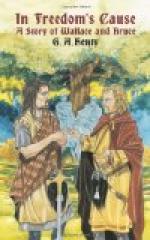When, two days later, Archie entered the gates of Berwick Castle the bells of the city were tolling, for a horseman had just ridden in with the news that Edward had expired on the evening before, being the 6th day of July, 1307, just at the moment when he was on the point of starting with the great army he had assembled to crush out the insurrection in Scotland.
So deep was his hate for the people who had dared to oppose his will that when dying he called before him his eldest son, and in the presence of his barons caused him to swear upon the saints that so soon as he should be dead his body should be boiled in a cauldron until the flesh should be separated from the bones, after which the flesh should be committed to the earth, but the bones preserved, and that, as often as the people of Scotland rebelled, the military array of the kingdom should be summoned and the bones carried at the head of the army into Scotland. His heart he directed should be conveyed to and deposited in the Holy Land.
So died Edward I, a champion of the Holy Sepulchre, King of England, Lord of Ireland, Duke of Aquitaine, conqueror of Wales, and would be conqueror of Scotland. In many respects his reign was a great and glorious one, for he was more than a great conqueror, he was, to England, a wise and noble king; and taken altogether he was perhaps the greatest of the Plantagenets.
Historians have striven to excuse and palliate his conduct toward Scotland. They have glossed over his crimes and tried to explain away the records of his deeds of savage atrocity, and to show that his claims to that kingdom, which had not a shadow of foundation save from the submission of her Anglo-Norman nobles, almost all of whom were his own vassals and owned estates in England, were just and righteous. Such is not the true function of history. Edward’s sole claim to Scotland was that he was determined to unite under his rule England, Scotland, Wales, and Ireland, and he failed because the people of Scotland, deserted as they were by all their natural leaders, preferred death to such a slavery as that under which Ireland and Wales helplessly groaned. His dying wishes were not observed. His body was laid in rest in Westminster Abbey, and on the tomb was inscribed, “Edward I the mallet of the Scots.”
Chapter XXIII The Escape from Berwick
On entering the castle Archie was at once conducted to a sort of cage which had been constructed for a previous prisoner. On the outside of a small cell a framework of stout beams had been erected. It was seven feet in height, six feet wide, and three feet deep. The bars were four inches round, and six inches apart. There was a door leading into the cell behind. This was closed in the daytime, so that the prisoner remained in the cage in sight of passersby, but at night the governor, who was a humane man, allowed the door to remain unlocked, so that the prisoner could enter the inner cell and lie down there.




